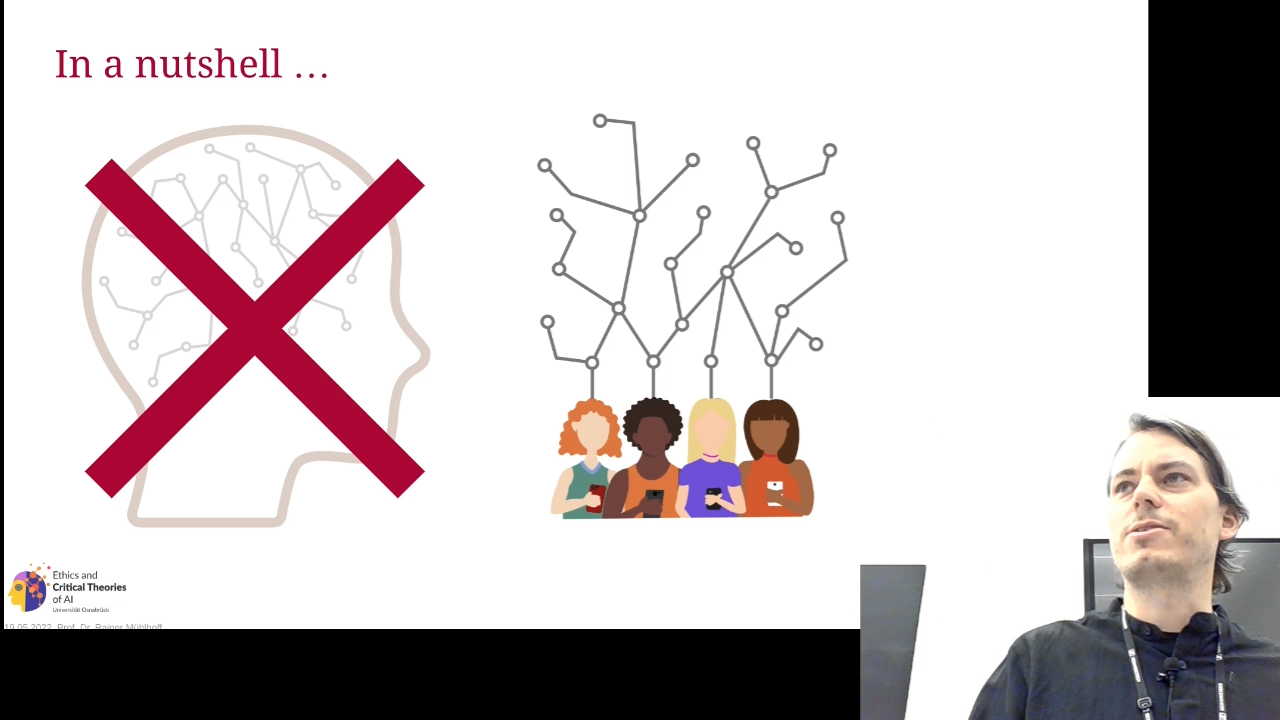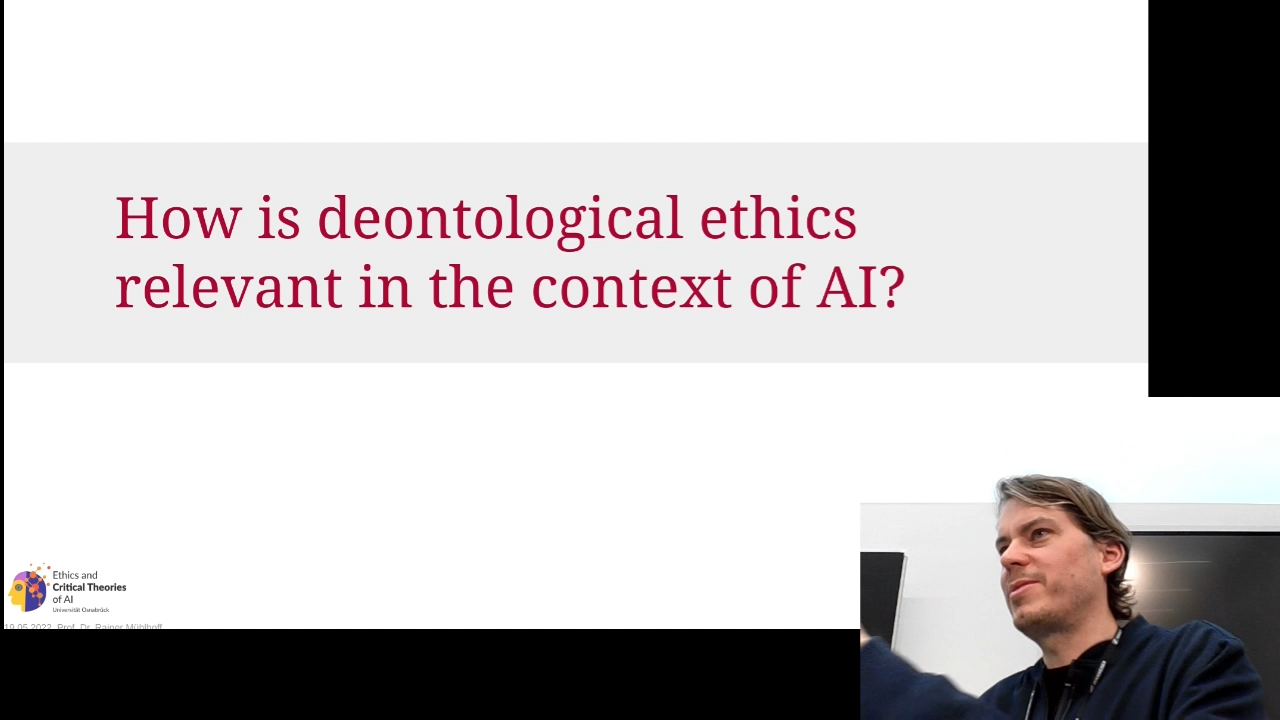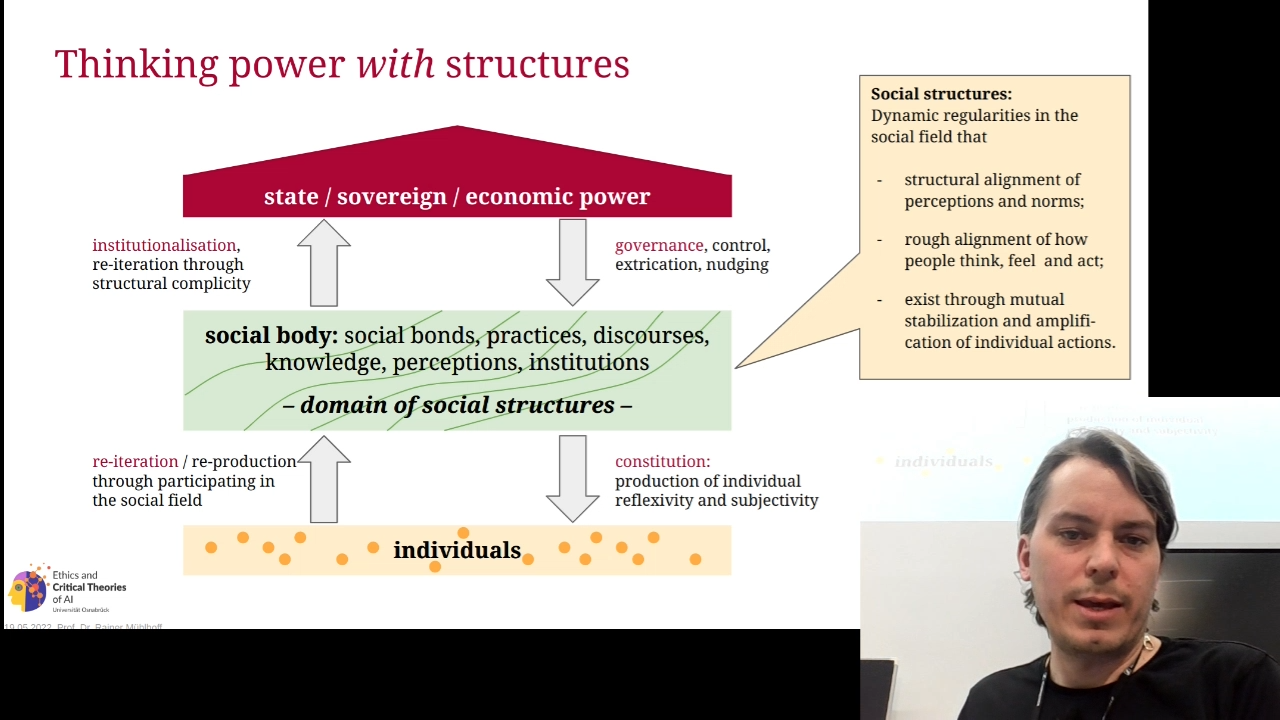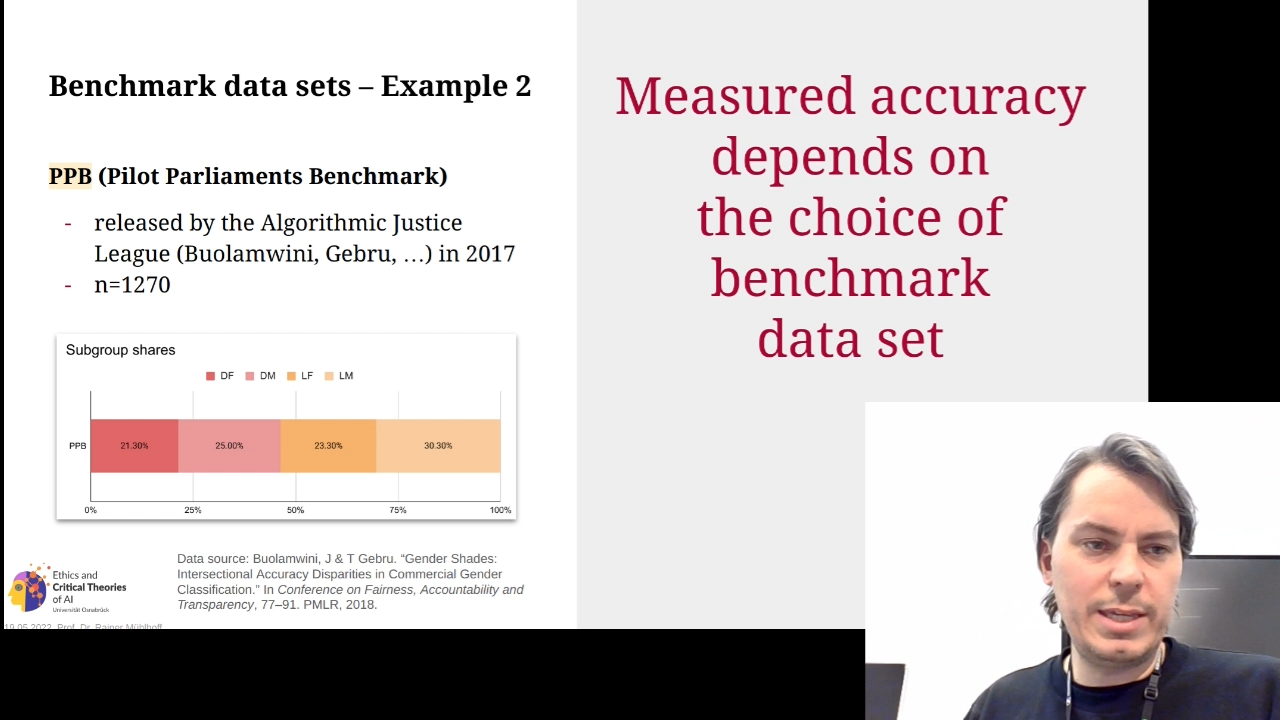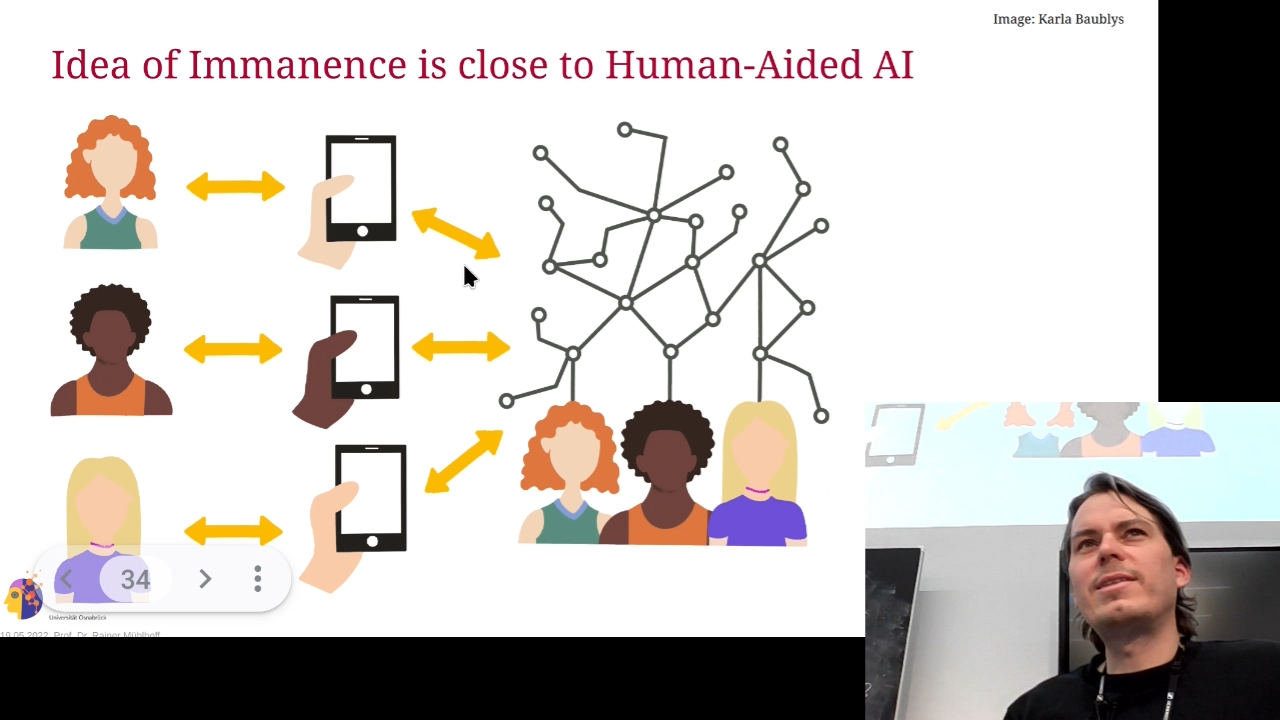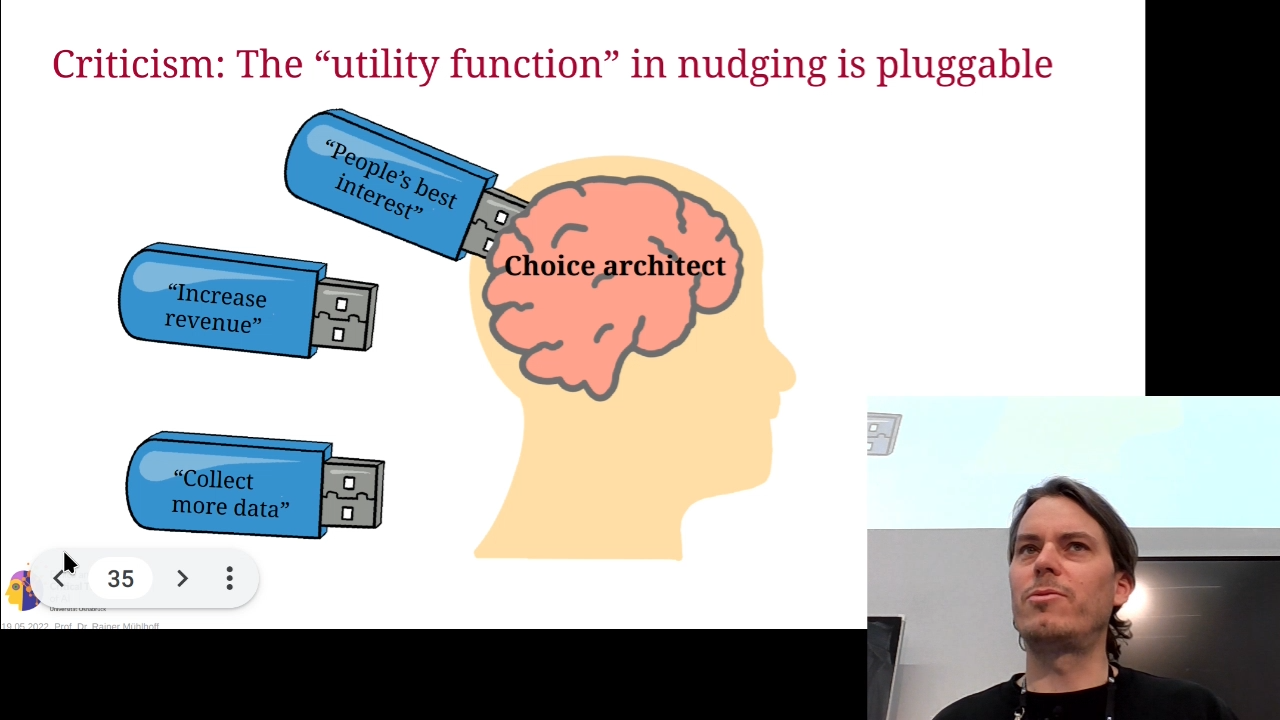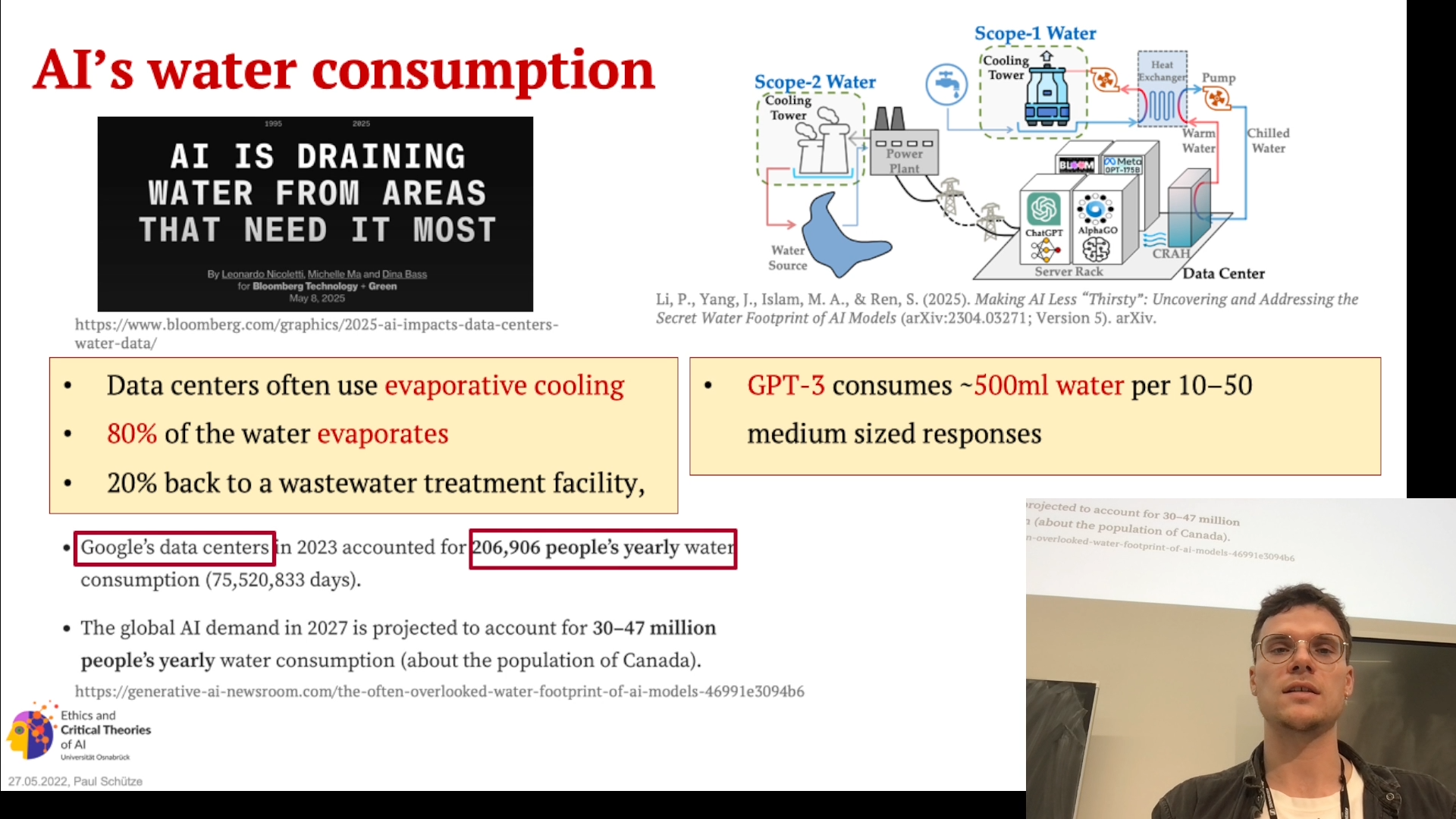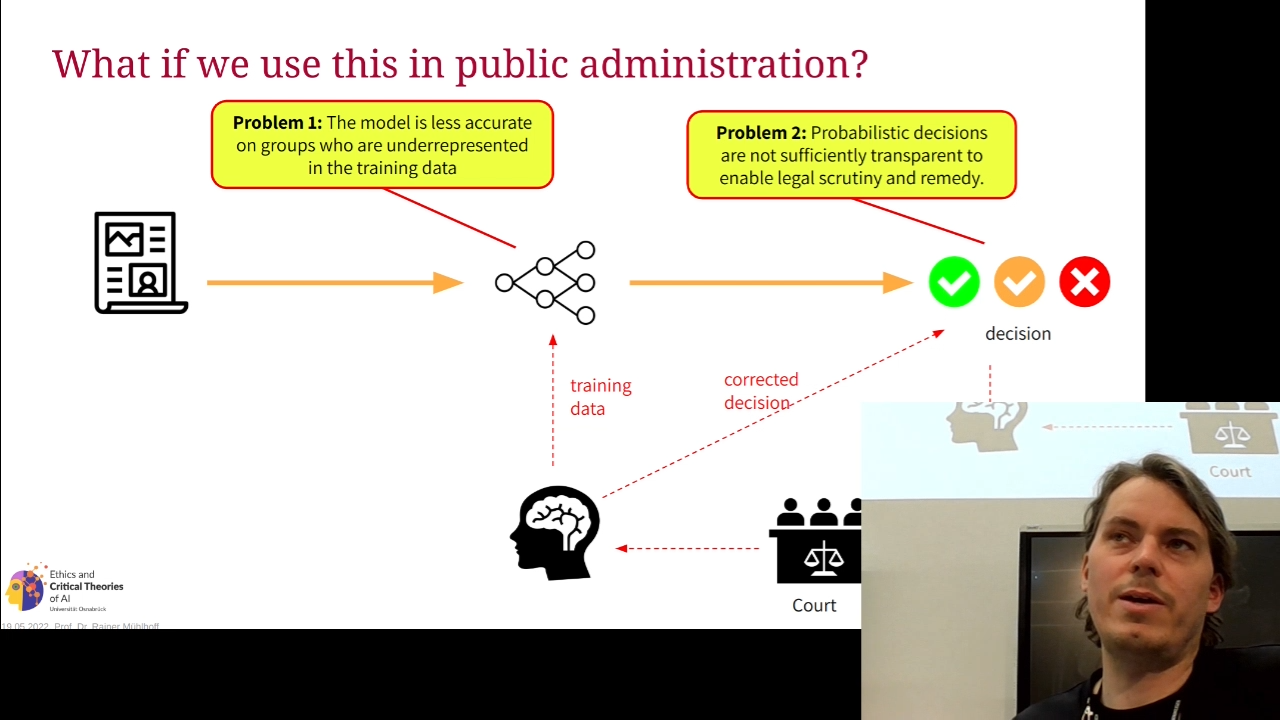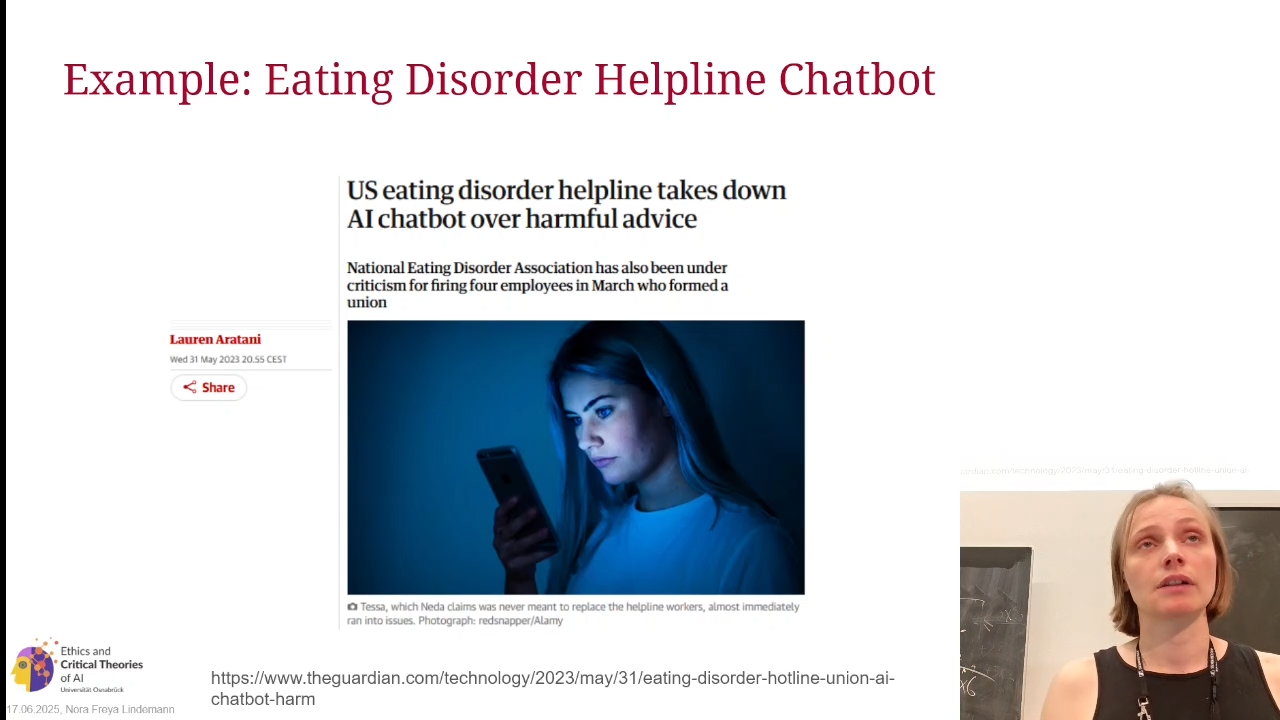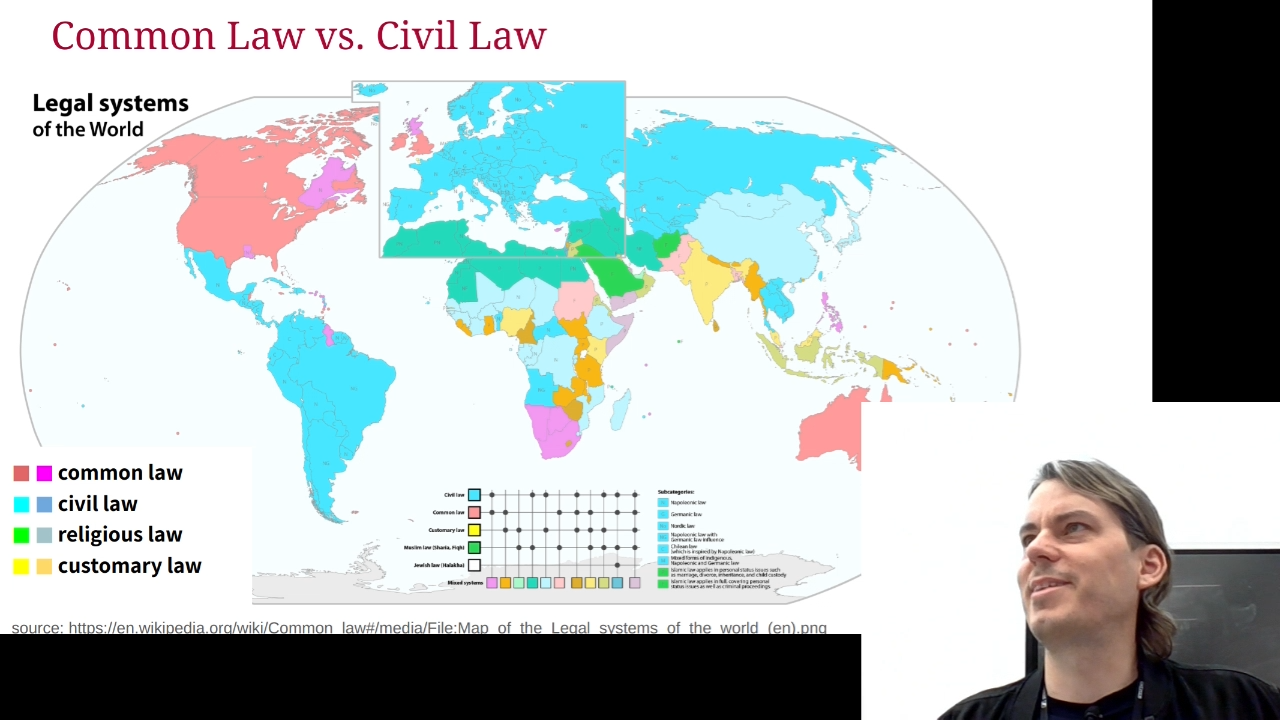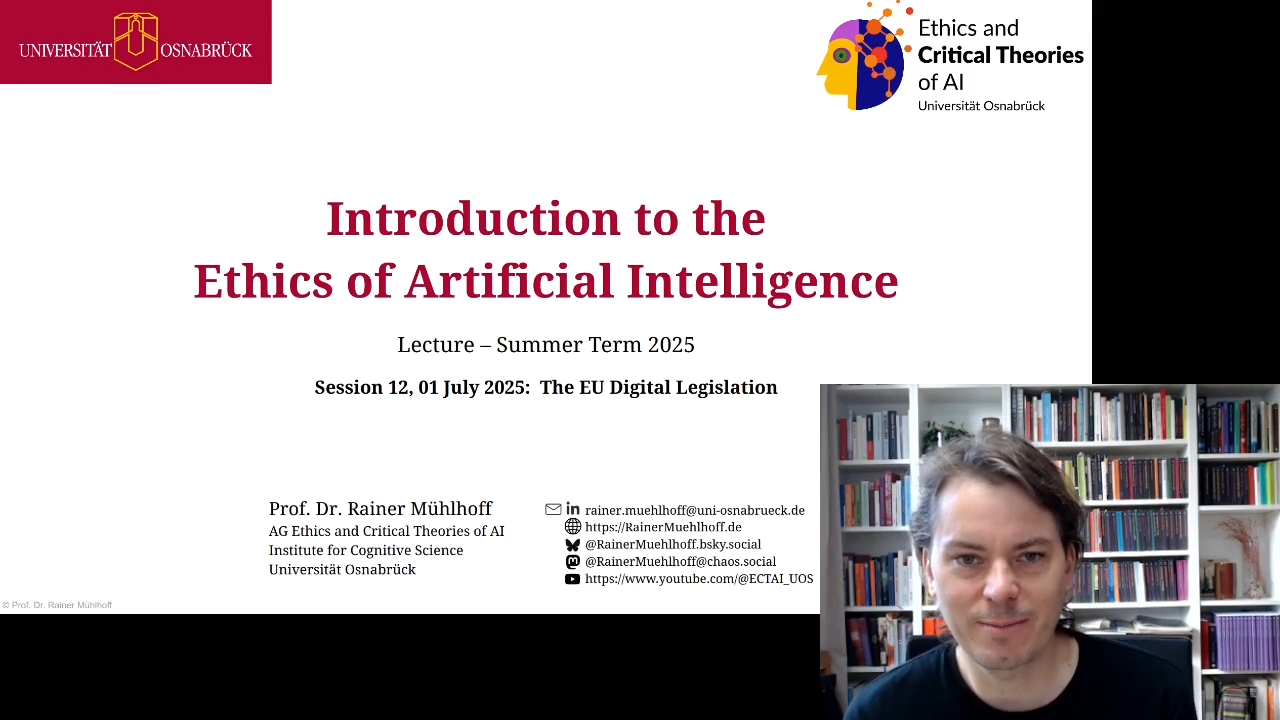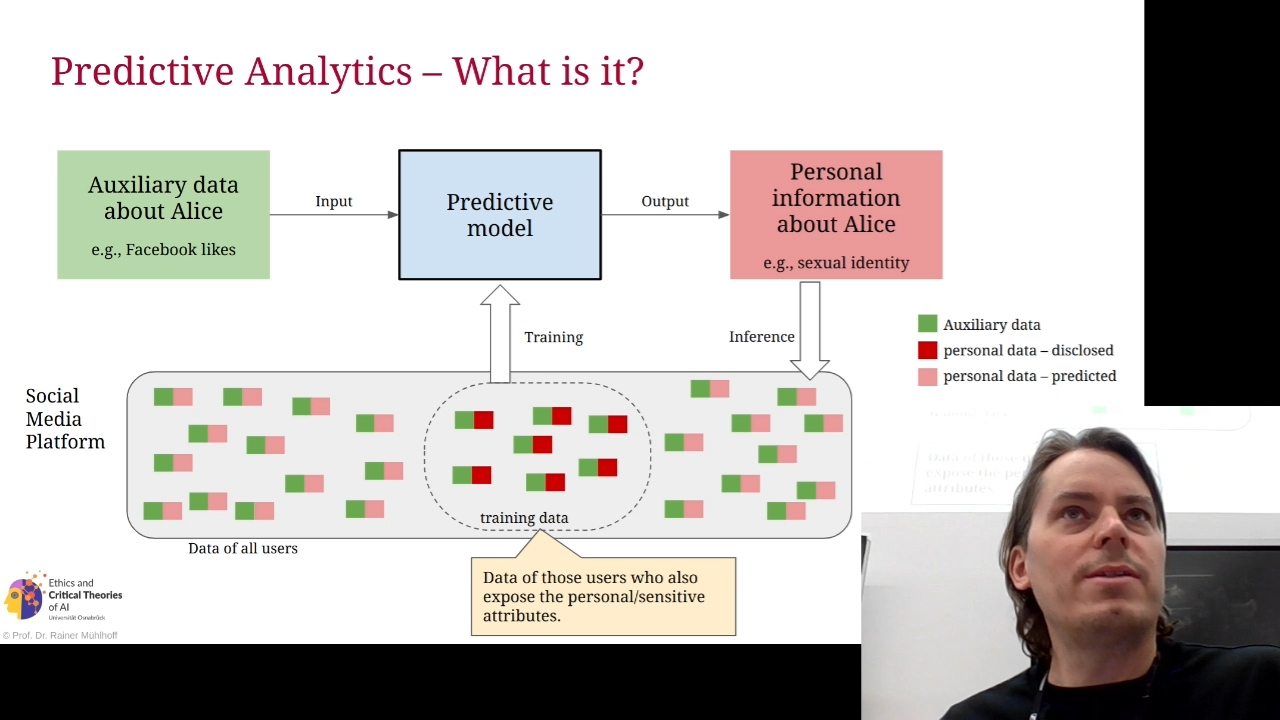Introduction to the Ethics of AI 2025
Lecture, University of Osnabrück, Summer Term 2025, Prof. Dr. Rainer Mühlhoff
Navigation: This is the most recent version of this lecture, from the summer term 2025.
Archive of past versions: [Summer Term 2024], [Winter Term 2022/23], [Winter Term 2021/22].
Recordings
Recordings are available on-site (with a nice index to jump between chapters) and on our YouTube channel. YouTube uploads might be 1–2 days delayed.
Responsibility & Explainability (by Nora Freya Lindemann)
General information
Access / Zoom link
The lecture can be accessed in three formats:
- On site: Tuesdays 14:15–15:45 CEST, starting 15 April 2025, room: see Stud.IP (for university members only).
- Live stream in Zoom: Tuesdays 14:15–15:45 CEST [Zoom-Link]
- Asynchronous participation via video recordings published on this website. I will make the recordings available by Wednesday evenings.
The lecture is public. Everybody can participate, although some additional functionality such as access to PDFs (slides, weekly discussion group readings) through Stud.IP, as well as participation in the weekly discussion groups, are exclusive to registered students.
Course description
This philosophical lecture provides an introduction to the emerging field of the Ethics and Critical Theories of AI. It is open to all interested students of all levels, including those from the humanities, as well as scientific and technical disciplines.
The lecture is an ideal starting point to get an orientation in the field and to possibly start engaging with more specialized courses and/or research projects in the context of the Ethics and Critical Theories of AI group at the Institute for Cognitive Science.
The lecture will provide an overview of relevant problems, philosophical theories and critical methods. This includes both the philosophical foundations of ethics, critical theory and some aspects of social philosophy (such as power and social structures) as well as different technological phenomena and legal aspects of AI. A particular focus will be contemporary data-driven and machine learning-based AI technology and its applications in digital consumer media. As we will see, questions of social equality and fairness are central to today’s ethical concerns about AI, so that ethics needs to adopt a societal perspective, analyzing constellations of power, subjectivation, discrimination and subordination that relate to AI technology. Ethics will be framed in relation to intersectional critical philosophy, feminist and post-colonial theories. We will also touch upon relevant legal debates such as privacy and data protection legislation and AI regulation.
Programme
This is a preliminary program – please visit this site regularly for updates.
| Session | Date | Lecture Topic | Backroud Readings (Discussion Groups) |
|---|---|---|---|
| 1 | 15.04. | Introduction / Human-Aided AI; Orga | Videos: 1) “Human Computation”, Google Tech Talk by Luis von Ahn, 2006. YouTube 2) “Artificial Intelligence is the New Electricity”, Stanford Talk by Andrew Ng, 2017. YouTube Coeckelbergh, Mark. 2020. AI Ethics. Cambridge, MA: The MIT Press. Chapters 1–2. |
| 2 | 22.04. | Ethics 101 | Dignum, Reponsible AI, Chapter 3. |
| 3 | 29.04. | Power I | Sattarov, Faridun. 2019. Power and Technology: A Philosophical and Ethical Analysis. Lanham: Rowman & Littlefield, pp. 17–26. optional: Netzpolitik, 2021-11-17. “Why chat control is so dangerous.” https://edri.org/our-work/why-chat-control-is-so-dangerous/ |
| 4 | 06.05. | Bias & Discrimination | Videos: Joy Buolamwini Video 1, Video 2, Kimberle Crenshaw Video Background reading: Friedman, Batya, and Helen Nissenbaum. 1996. “Bias in computer systems.” ACM Transactions on Information Systems 14(3). |
| 5 | 13.05. | Power II | Mühlhoff, Rainer. 2025. The Ethics of AI: Power, Critique, Responsibility. Bristol University Press. From the Introduction pp. 1–3; from Chapter 4, pp. 75–84. Optional background reading: Manifesto for a Power-Aware Ethics of AI, pp. 172–181. |
| 6 | 20.05. | AI Paternalism | Mühlhoff, Rainer. 2025. The Ethics of AI: Power, Critique, Responsibility. Bristol University Press. Chapter 3. Backround reading (optional): Lacey, Cherie, and Catherine Caudwell. 2019. Cuteness as a Dark Pattern in Home Robots. In 2019 14th ACM/IEEE International Conference on Human-Robot Interaction (HRI), 374 81. IEEE. |
| 7 | 27.05 | AI and sustainability | van Wynsberghe, A. (2021). Sustainable AI: AI for sustainability and the sustainability of AI. AI and Ethics, 1(3), 213–218. DOI: 10.1007/s43681-021-00043-6. Optional background reading: Heilinger, J.-C., Kempt, H., & Nagel, S. (2024). Beware of sustainable AI! Uses and abuses of a worthy goal. AI and Ethics, 4(2), 201–212. DOI: 10.1007/s43681-023-00259-8. |
| 8 | 03.06. | AI and tech ideologies | Gebru, Timnit, and Émile P. Torres. 2024. The TESCREAL Bundle: Eugenics and the Promise of Utopia through Artificial General Intelligence. First Monday, April. DOI: 10.5210/fm.v29i4.13636. Optional background reading: Golumbia, David. 2024. Cyberlibertarianism: The Right-Wing Politics of Digital Technology. Minneapolis: University of Minnesota Press. |
| 9 | 10.06. | AI and the State | Roberts, Brandon, and Vernal Coleman. 2025. Inside the AI Prompts DOGE Used to Munch Contracts Related to Veterans Health. ProPublica, June 6, 2025. https://www.propublica.org/article/inside-ai-tool-doge-veterans-affairs-contracts-sahil-lavingia. |
| 10 | 17.06. | Responsibility & Explainability | Coeckelbergh, Mark. „Artificial intelligence, responsibility attribution, and a relational justification of explainability“. Science and Engineering Ethics 26(4), 2020: 2051–68. DOI: 10.1007/s11948-019-00146-8 |
| 11 | 24.06 | Data Protection – foundations | Wachter, Sandra. 2018. The GDPR and the Internet of Things: A Three-Step Transparency Model. Law, Innovation and Technology 10 (2): 266–94. Read only pages 1–10 (until the end of section 3.1). DOI: 10.1080/17579961.2018.1527479. Wachter, Sandra. 2019. Data Protection in the Age of Big Data. Nature Electronics 2 (1): 6–7. DOI: 10.1038/s41928-018-0193-y. |
| 12 | 01.07. | The EU digital legislation | Ruschemeier, Hannah. 2023. “AI as a Challenge for Legal Regulation – the Scope of Application of the Artificial Intelligence Act Proposal.” ERA Forum 23 (3): 361–76. DOI: 10.1007/s12027-022-00725-6. |
| 13 | 08.07. | Data Protection and AI | Mühlhoff, Rainer. 2021. Predictive Privacy: Towards an Applied Ethics of Data Analytics. Ethics and Information Technology 23: 675 90. DOI: 10.1007/s10676-021-09606-x. |
| 14 | 15.07. | Written exam / Klausur | Room: 01/E01 + 01/B01. Be on time at 14:00! Good luck for the exam :-) |
Grading stuff
ECTS points for registered students
The class is offered as a lecture with optional discussion groups. Registered students can earn 4 ECTS points for the lecture and additional 4 ECTS points for discussion groups.
- Lecture: regular perticipation in the lecture is required (on site, streaming or recordings). Final written exam on 15 July 2025, 14–16, in the lecture hall. For those who fail the exam, there will be a make-up exam data in the first week of the winter term.
- Closed book exam on paper on site in the lecture hall; mostly multiple choice questions; no electronic devices allowed.
- Important: Register for the exam in EXA/Hisinone! Registration ends 1 week before exam. Not registered = no exam. You can register now and unregister until one week before the exam.
ECTS points / certificate for external students and exchange students
If you are an external student participating from anywhere in the world, or if you are an exchange student at the University of Osnabrück but cannot register for the exam through EXA, you can still obtain 4 ECTS points under the following circumstances:
- Make sure to participate in the exam on site in Osnabrück on 15 July 2025, 14–16.
- Provide a pre-filled document/certificate you want me to sign (PDF).
- Send this to my office before the exam date: office-muehlhoff (ät) uni-osnabrueck.de. Subject line: exam ethics of AI.
Discussion Groups (optional)
Discussion groups are optional and with limited capacity. They offer in-depth discussion of the lecture content and beyond. Perfect if you would like to get deeper into the field. Discussion groups meet 2 hrs/week with 15–20 students per group. Participants have to prepare a weekly reading.
For completing a discussion group you can earn additional 4 ECTS points for the “freie Wahlbereich”. To earn points, you have to participate regularly in your discussion group and hand in a video or audio podcast to your discussion group once during the semester. Deadline: Tue, 1 July 2025, 23:59 CET. Please find details, advice & FAQ on video/audio homework here.
Important: To receive points you will have to register for the exam in EXA by week 3 of term!!
Capacities for discussion groups are limited to 3x 20 students. Registration on Stud.IP starts Thursday 17 April, 10:00 am CEST. First come, first served. All discussion groups are on-site and in English.
List of available discussion groups and Stud.IP links:
| Group | Time | Room | Tutor | Stud.IP | Free capacity |
|---|---|---|---|---|---|
| 1 | Fridays 10–12 | 35/E23-24 | Lay Vu | Link | 0 |
| 2 | Thursdays 14–16 | 66/E34 | Frieda Schrader | Link | 0 |
| 3 | Thursdays 10–12 | 69/E23 | Sean Quägwer | Link | 0 |
Announcements concerning the written exam
Please help us realising a smooth exam with 280 participants in 4 different locations by observing these rules and announcements.
When and where?
- The exam will take place in rooms 01/E01, 01/B01, 01/B02
and 15/E10(!!!). Please follow this distribution according to the first letters of your last name:- Last names A… – Re… ==> Room 01/E01
- Last names Rh… – S… ==> Room 01/B01
- Last names T… – Z ==> Room 01/B02
- Please arrive on time at 14:00 on the exam day (15.07.). Wait until you will be let into the room and then swiftly take a seat. We aim to start at 14:15.
- When taking a seat, fill the rows starting in the middle of each row. Only every second row will be open and only every second seat can be filled.
- Please register for the exam on EXA/HisInOne until 1 week before the date. If you cannot register, please come to the exam anyway. But make sure you tried registering.
Rules and procedure
- You need to bring a photo ID (student ID or legal document with photo) and place it on your table. It will be checked during the exam.
- The exam is strictly closed-book: No notes, books, digital tools (tables, computers, smartphones, smartwatches) allowed. Breach of this rule will lead to immediate exclusion.
- The exam takes 90 minutes.
- After to you finished you exam, in order not to disturb the others please stay seated and do not leave the room until the end of the session. Do not use electronic devices during that time.
- Please leave your seat only once your exam sheet was collected by the supervisors. That is, please stay seated until the supervisor passed through your row to collect the exam sheets.
Form and contents of the exam
- The exam is multiple choice. It covers questions on the sessions of the lecture. Broadly speaking, each session will be covered.
- The exam contains ca. 10 pages, font size 11.
- Best preparation is to go through the slides again.
- The exam will focus on important definitional, conceptual and factual questions. Sometimes a judgement is to be made.
Retake exam
- The retake exam is for re-take purposes only. That is: for those who failed the first attempt, were sick (with a doctor’s statement) or were abroad as part of their studies (with written proof). If you cannot attend the first exam for any of these reasons and need to register for the retake exam, please write an email with subject line “Intro to the Ethics of AI: retake exam” briefly detailing your situation and your general availability for the retake exam to my secretary Andrea, office-muehlhoff .aa.t uni-osnabrueck.de.
- The date for the retake exam is not yet determined.

